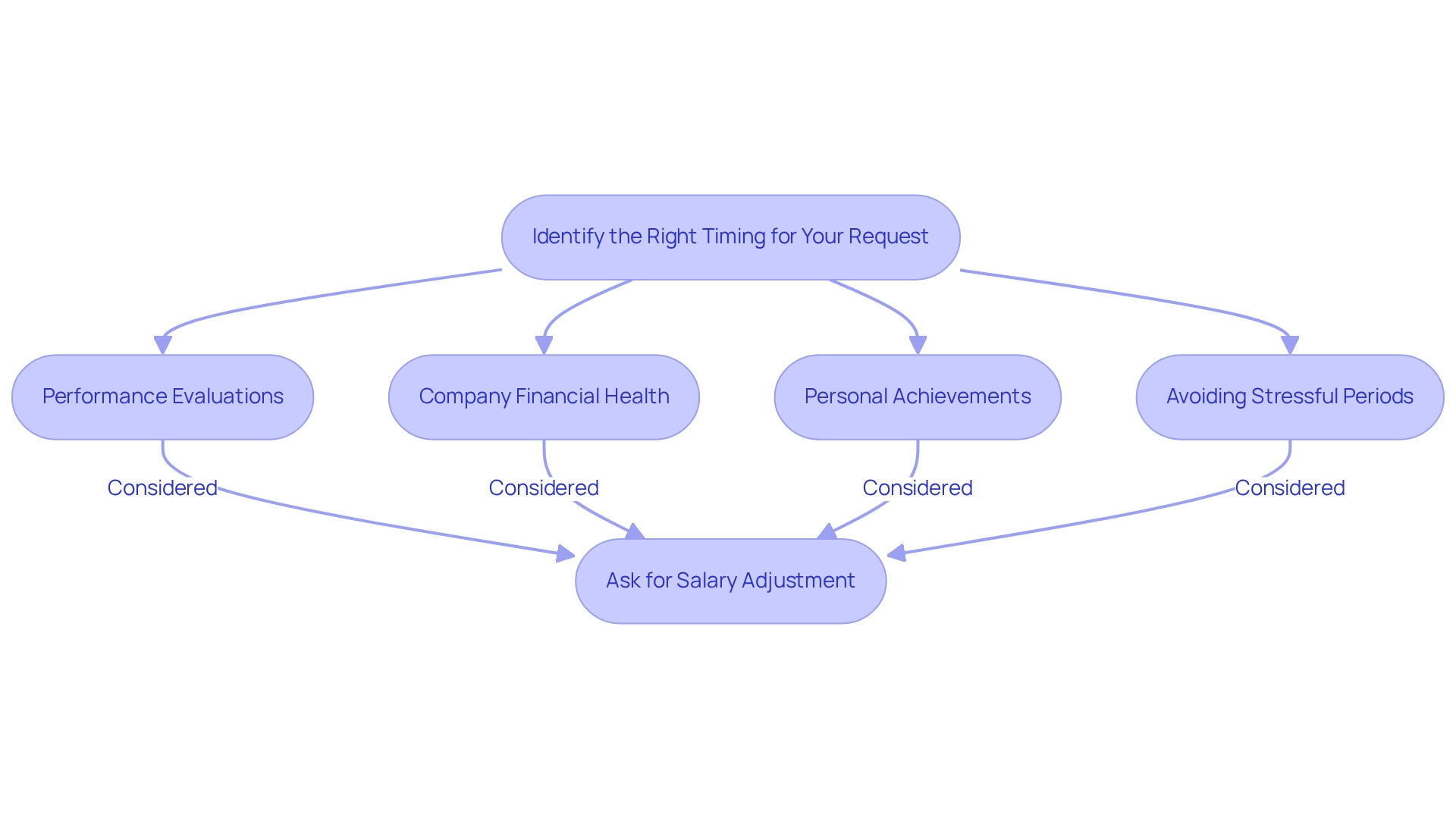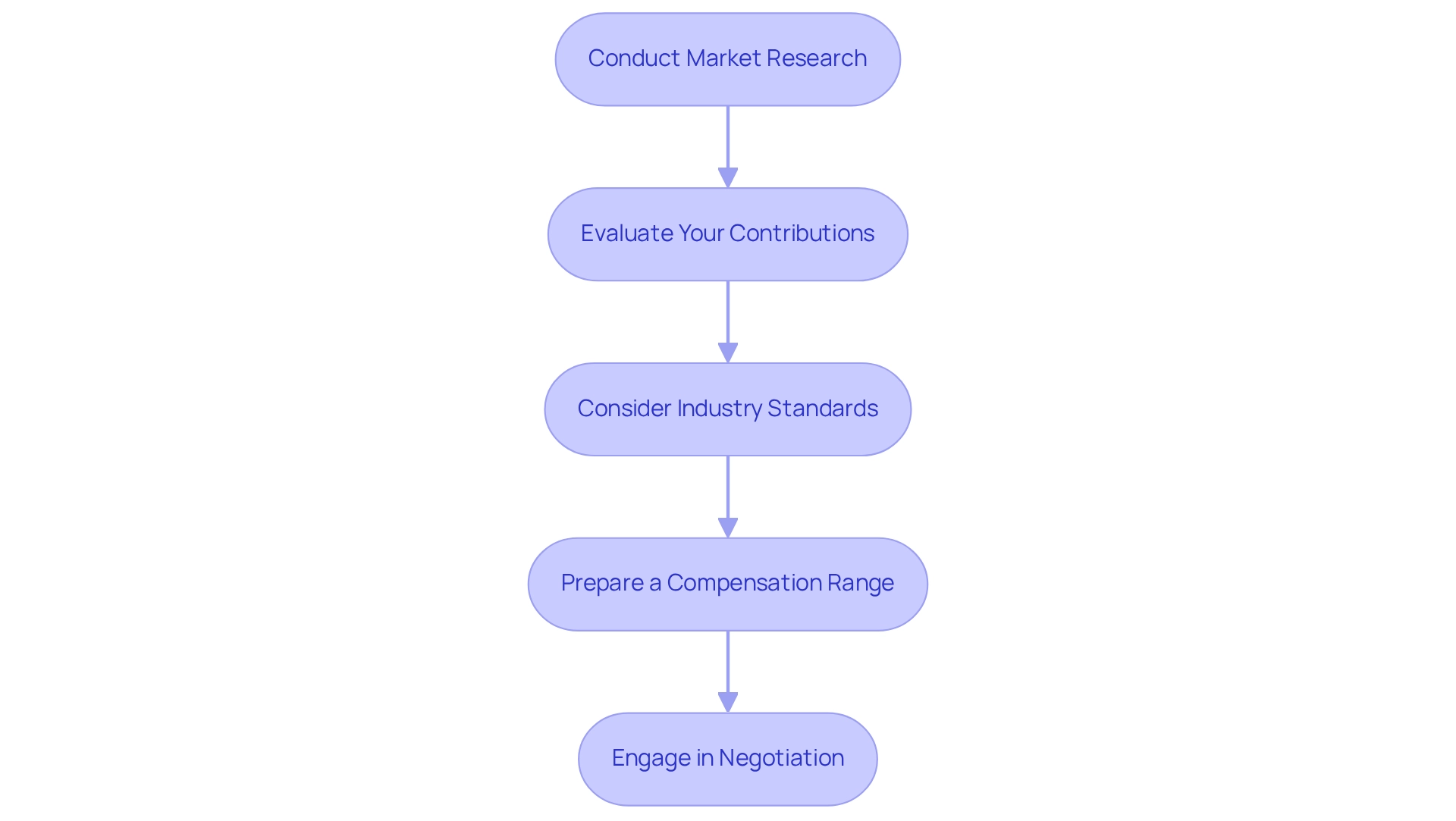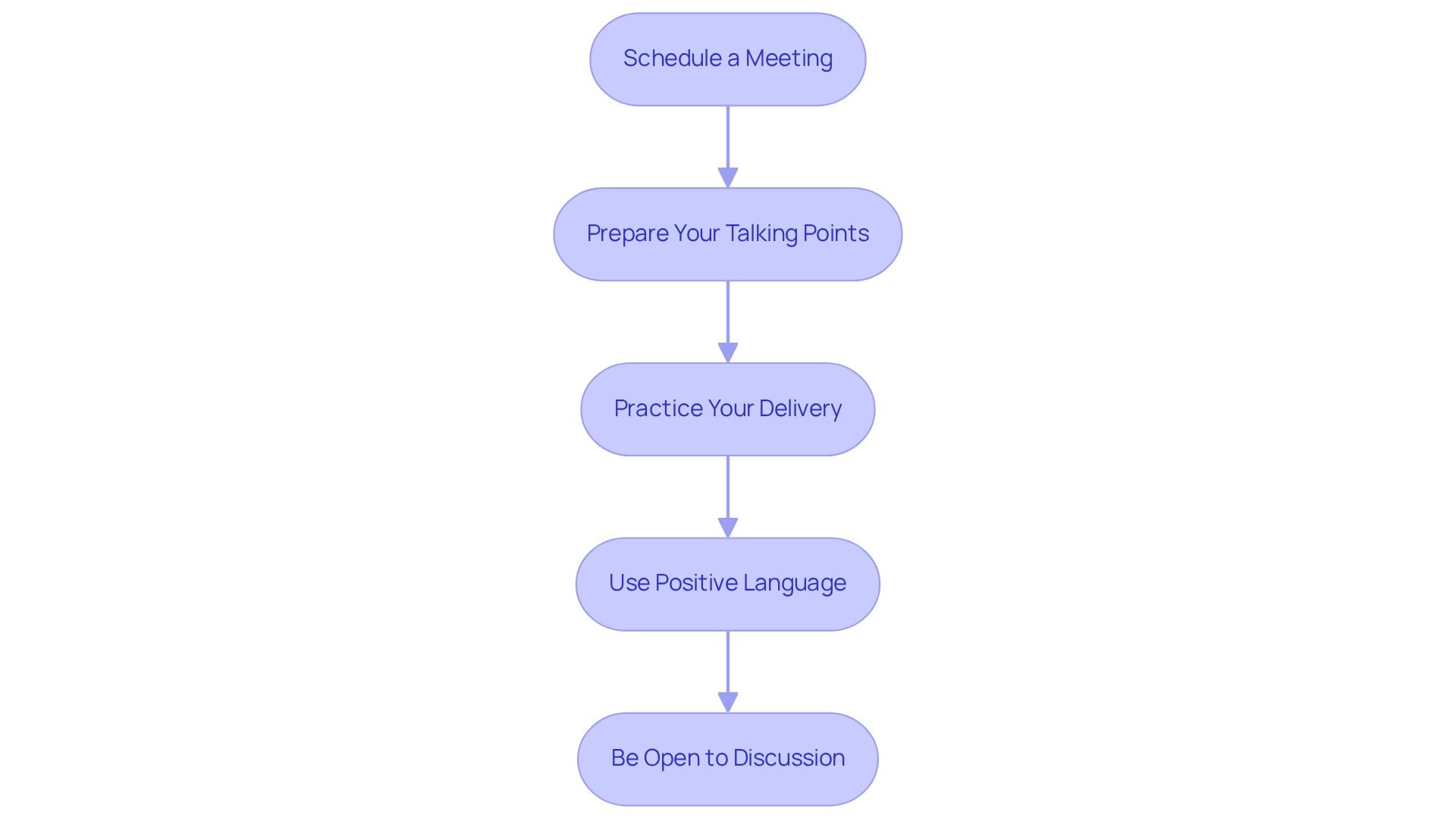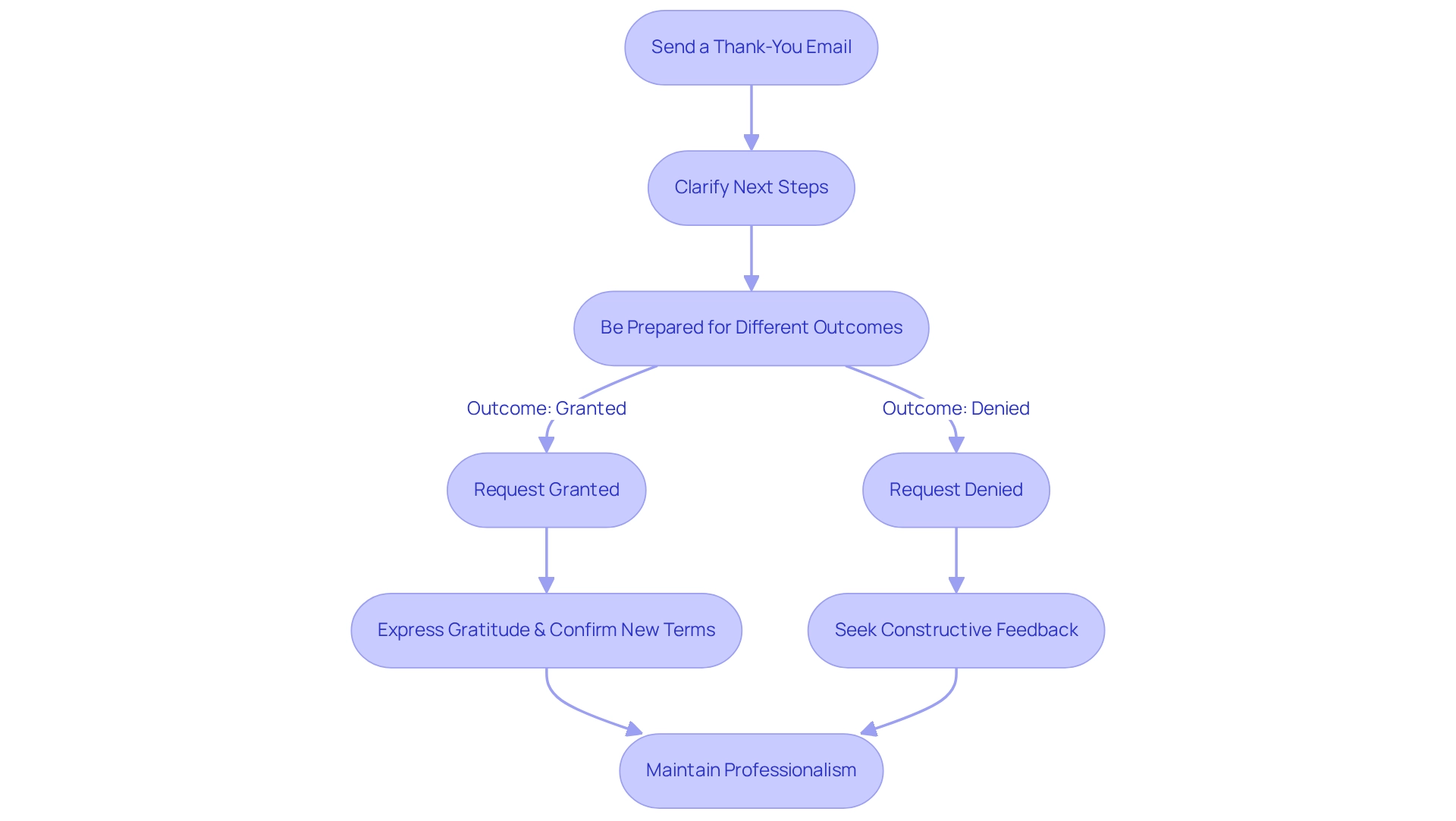Overview
To effectively request a salary adjustment, it is crucial to:
- Strategically identify the appropriate timing.
- Conduct comprehensive research on market compensation.
- Prepare a compelling case for discussion.
Aligning requests with performance evaluations is essential, as is demonstrating personal contributions. Maintaining professionalism throughout the negotiation process significantly increases the likelihood of achieving a favorable outcome.
Key Highlights:
- Identify optimal timing for salary requests, such as during performance evaluations.
- Assess company financial health to determine the right moment for salary discussions.
- Timing your request after personal achievements can strengthen your case.
- Avoid making requests during high-stress periods to increase chances of a favorable outcome.
- Conduct thorough research on market compensation data to understand your worth.
- Compile a list of personal contributions and quantify achievements to support your request.
- Stay informed about industry salary trends to establish realistic expectations.
- Prepare a compensation range based on research to guide salary discussions.
- Schedule a dedicated meeting to discuss salary adjustments, demonstrating seriousness.
- Prepare structured talking points that include research and contributions to make a compelling case.
- Practice your delivery to enhance clarity and confidence during discussions.
- Use positive language to frame your salary request constructively.
- Send a thank-you email post-discussion to maintain professionalism and keep communication open.
- Clarify next steps if the request is not immediately approved to show ongoing interest.
- Be prepared for various outcomes and seek constructive feedback if denied.
- Maintain professionalism and high performance regardless of the negotiation outcome.
Introduction
Navigating the complex landscape of salary negotiations is not merely a daunting task; it is an essential skill that can propel your career forward. Recognizing when and how to advocate for a salary adjustment can profoundly impact the results of these critical discussions. Each step—from identifying the optimal timing to presenting a compelling case—demands meticulous consideration and thorough preparation.
This article explores effective strategies for requesting a salary increase, underscoring the significance of:
- Timing
- Comprehensive research
- Clear communication
- Professional follow-up
By arming oneself with the right tools and knowledge, professionals can significantly enhance their prospects of securing the compensation they rightfully deserve.
Identify the Right Timing for Your Request
To effectively ask for salary adjustment, it is crucial to identify the optimal timing for your approach. Consider the following strategies:
- Performance Evaluations: Align your request with annual performance evaluations. These discussions inherently involve compensation considerations, presenting a strategic opportunity to ask for a salary adjustment and advocate for your value.
- Company Financial Health: Assess the company’s financial performance. If recent reports indicate robust earnings, this could create a favorable environment for your appeal to ask for salary adjustment, as management may be more open to compensation discussions. Understanding workforce dynamics is vital; for example, newcomers to farming now account for only 3.6 percent of the crop farm workforce, underscoring the importance of employment stability when contemplating salary adjustments.
- Personal Achievements: Timing your appeal shortly after completing a significant project or receiving commendation from your manager can reinforce your contributions and help you effectively ask for salary adjustment.
- Avoiding Stressful Periods: Avoid high-pressure times, such as critical project deadlines or organizational crises. Requests made during these periods may be overlooked or met with resistance, reducing your chances of a favorable outcome. If your request is declined, your supervisor should provide reasons for the decision, whether based on your performance, the company’s financial status, or other considerations, as noted by academic advisor Jennie VanderHooven.

Conduct Research and Assess Your Value
Conducting thorough research to evaluate your market worth is crucial when you ask for a salary adjustment in effective compensation discussions.
- Utilize platforms such as Glassdoor, PayScale, and sector-specific reports to gather average compensation information for your position within your geographic region.
- According to the Bureau of Labor Statistics, occupational employment estimates for May 2023 indicate that understanding your position in the market is essential for effective negotiations.
- Additionally, consider the high-demand positions in finance and technology, such as CFOs, Financial Managers, and Chief Technology Officers, as these roles often have unique compensation benchmarks that can guide your discussions.
Evaluate Your Contributions:
- Compile a comprehensive list of your achievements, skills, and any additional responsibilities you have taken on since your last compensation review.
- Quantify your contributions with metrics wherever possible, such as revenue generated or projects completed, to provide concrete evidence of your value.
Consider Industry Standards:
- Stay informed about current salary trends within the finance industry, particularly for specialized roles.
- Understanding these trends will assist you in establishing realistic expectations and enhancing your bargaining stance when you ask for a salary adjustment.
- Eric Eddy from CPA Resources Global Professionals emphasizes that being aware of market standards is essential for successful discussions, particularly for positions that Boutique Recruiting focuses on.
Prepare a Compensation Range:
- Based on your research, establish a compensation range that accurately reflects your worth and aligns with market standards.
- This range will serve as a foundation for your discussions, enabling you to ask for a salary adjustment effectively for your desired compensation.
- Boutique Recruiting’s comprehensive recruitment services illustrate the importance of tailored approaches in compensation negotiations, reinforcing the notion that understanding market standards is crucial for effective discussions.

Present Your Case Clearly and Confidently
To effectively present your case for a salary adjustment, follow these essential steps to ensure clarity and confidence:
- Schedule a Meeting: Initiate a formal request for a dedicated meeting to ask for salary adjustment and discuss your compensation. This approach demonstrates your seriousness about the topic and allows for a focused conversation. Notably, 51% of sales professionals consider in-person meetings to be the most effective sales channel, underscoring the significance of face-to-face discussions in compensation negotiations.
- Prepare Your Talking Points: Develop a structured outline of key points to discuss, including your research on compensation benchmarks, your contributions to the organization, and the specific pay range you are targeting. This preparation is crucial for constructing a compelling argument. For instance, instructional designers with a portfolio earn approximately 7% more than those without, highlighting the importance of showcasing your skills and contributions.
- Practice Your Delivery: Rehearse your presentation to enhance clarity and confidence. Engaging in role-play with a colleague or mentor can help refine your delivery and anticipate potential questions.
- Use Positive Language: Frame your request in a constructive manner. Instead of stating, “I need a raise,” consider saying, “Given my contributions and the current market trends, I believe a compensation adjustment is justified.”
- Be Open to Discussion: Foster a two-way dialogue during the meeting. Encourage your manager to share their perspective, and be prepared to respond thoughtfully to their feedback. This collaborative approach can lead to a more productive conversation.
As the negotiation training service market is projected to reach multi-million US dollars by 2029, the importance of negotiation skills in the workplace is increasingly evident. By following these steps, you can present your compensation case with confidence and clarity when you ask for a salary adjustment, thereby increasing the likelihood of a favorable outcome. Furthermore, consider examining the case study titled ‘The Importance of an Instructional Design Portfolio,’ which illustrates how preparation and presentation can significantly influence compensation results, particularly for individuals with less experience.

Follow Up and Handle Responses Professionally
In the aftermath of your salary negotiation discussion, it is essential to navigate the next steps with professionalism and strategic intent:
- Send a Thank-You Email: Regardless of the outcome, promptly send a thank-you email to express your appreciation for your manager’s time and consideration. This simple gesture reinforces your professionalism and keeps the lines of communication open.
- Clarify Next Steps: If your inquiry was not promptly approved, you should ask for a salary adjustment and inquire about the next steps or the timeline for a decision. This illustrates your ongoing interest and involvement in the process, which can positively impact future conversations.
- Be Prepared for Different Outcomes: Should your request be granted, express your gratitude and confirm any new terms. Conversely, if it is denied, seek constructive feedback on what you can do to enhance your chances for a future raise. This proactive approach can help you to ask for salary adjustment in order to align your efforts with the expectations of your organization.
- Maintain Professionalism: Regardless of the outcome, continue to excel in your role. Steady high performance not only maintains your positive reputation but also places you advantageously for future compensation conversations. Statistics show that maintaining professionalism can significantly impact your career trajectory, as 81% of sales teams investing in AI have seen improved performance through enhanced engagement strategies. Moreover, economic instability can lead job seekers to feel less confident in advocating for improved compensation, highlighting the necessity for a strategic approach in these conversations.
By integrating these strategies, you can foster more productive compensation negotiations and enhance your professional connections, ultimately aiding your career advancement. Furthermore, ongoing engagement and training, as highlighted in the case study “The Impact of Training on Sales Performance,” can lead to improved outcomes, paralleling the importance of follow-up after salary discussions.

Conclusion
Mastering the art of salary negotiation is an invaluable skill that can significantly influence career advancement. By focusing on the right timing, conducting thorough research, presenting a well-structured case, and following up professionally, individuals can enhance their chances of securing the compensation they deserve.
Identifying the optimal moment to initiate salary discussions is paramount. Aligning requests with performance reviews, being mindful of the company’s financial health, and capitalizing on personal achievements can all create a favorable context for negotiations. Additionally, comprehensive research on market salary data and personal contributions equips professionals with the information necessary to advocate for a fair salary adjustment.
Presenting a clear and confident case during negotiations is essential. This involves scheduling dedicated meetings, preparing key talking points, and engaging in constructive dialogue with management. A positive and collaborative approach can foster a more productive conversation, increasing the likelihood of a successful outcome.
Lastly, handling the aftermath of salary discussions with professionalism is crucial. Sending thank-you notes, clarifying next steps, and maintaining high performance are all strategies that reinforce commitment and professionalism, regardless of the negotiation’s outcome.
Ultimately, by implementing these strategies, professionals can navigate salary negotiations with confidence, ensuring they advocate effectively for their worth while fostering positive relationships within their organization. The journey towards securing deserved compensation is not just about the salary itself but also about developing skills that can pave the way for future opportunities and growth.
Frequently Asked Questions
What is the best timing to ask for a salary adjustment?
The optimal timing to ask for a salary adjustment includes aligning your request with annual performance evaluations, assessing the company’s financial health, timing it shortly after personal achievements, and avoiding high-pressure periods.
How can performance evaluations help in requesting a salary adjustment?
Performance evaluations are strategic opportunities as they inherently involve discussions about compensation, allowing you to advocate for your value during these conversations.
Why is it important to consider the company’s financial health before asking for a salary adjustment?
If the company has recently reported strong earnings, it may create a favorable environment for your request, as management may be more open to discussions about compensation.
When is a good time to make a salary adjustment request based on personal achievements?
It’s effective to ask for a salary adjustment shortly after completing a significant project or receiving commendation from your manager, as this reinforces your contributions.
What should be avoided when timing a salary adjustment request?
You should avoid making requests during high-pressure times, such as critical project deadlines or organizational crises, as these requests may be overlooked or met with resistance.
What happens if my salary adjustment request is declined?
If your request is declined, your supervisor should provide reasons for the decision, which could be based on your performance, the company’s financial status, or other considerations.